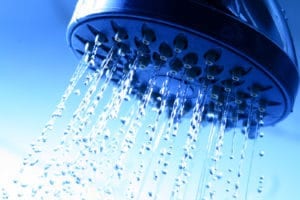An Introduction to Hard Water: Facts and Treatment Options
If you live in San Diego or Southern California in general, you’ve likely heard about hard water. Virtually omnipresent in our region of the world, hard water is a substance that’s still mysterious to many people. Most know that it can be damaging, but few know what hard water actually is, how it’s caused, or how to treat it. In this guide, we are here to clear the air (or water). Below, you’ll find a general overview of hard water—what it is, how to spot it, and whether it is safe for your property. You’ll also find information on several treatment options including the eco-friendly and highly-effective Enviro Whole-House Filtration system, which we offer.

What Is Hard Water?
Hard water is water that is high in mineral content. Hard water is typically caused by heightened concentrations of calcium and magnesium. It is a result of groundwater flowing over or through limestone.
There are two types of water hardness — temporary hardness and permanent hardness. Each has its own distinct properties. Temporary hardness: Caused by the presence of dissolved bicarbonate minerals (calcium bicarbonate and magnesium bicarbonate) in water. It can be greatly reduced by boiling. This promotes the formation of carbonate from the bicarbonate and precipitates calcium carbonate out of the solution. It leaves water that is softer (lower in mineral content) upon cooling. A process called lime softening is when temporary water hardness is controlled through the addition of limewater (calcium hydroxide) to hard water.
Permanent hard water is hard water that cannot be softened through boiling or lime softening. It is typically caused by the presence of calcium sulfate/calcium chloride and/or magnesium sulfate/magnesium chloride in the water supply. Permanent hard water can only be treated through professional methods, such as the use of a water softener or ion exchange column. You can learn more about these treatment methods in the Treating Hard Water section in this post.
Is It Safe?
The scientific community is still studying the safeness of hard water with respect to human health. They have not found any definitive evidence suggesting that hard water poses any long-term health risks. The World Health Organization maintains that “there does not appear to be any convincing evidence that water hardness causes adverse health effects in humans.” Studies conducted by the National Academy of Sciences found that hard water can safely serve as a dietary supplement for calcium and magnesium.
While no major health concerns have been linked to hard water, there is some evidence that the chemical composition of hard water can have more minor effects on the human body. Excess calcium and magnesium in water can irritate skin and dry out hair for some people. Many claim that hard water is more difficult to rinse off the body due to the way it interacts with soaps.
Structural Damages Caused by Hard Water
Hard water may not be the worst thing for your body, but it isn’t doing your appliances and plumbing any favors. Minerals in hard water form deposits can clog pipes and drains. These deposits are commonly called “scale,” mainly composed of calcium carbonate, magnesium hydroxide, and calcium sulfate. Over time, scale buildup can restrict the flow of water in pipes. In boilers, scale buildup can impair the flow of heat into water. This reduces the heating efficiency causing the metal components within boilers to overheat. In pressurized systems, this can often lead to boiler failure.
Hard water can also lead to galvanic corrosion in metal fixtures. Galvanic corrosion occurs when one metal preferentially corrodes when in contact with another type of metal and both metals are in contact with an electrolyte. When hard water has a high concentration of electrolytes, it creates the perfect conditions for galvanic corrosion in pipes and other metal fixtures. This can greatly reduce the lifespan of these fixtures, leading to costly repairs and untimely replacements.
A final issue caused by hard water is its effect on laundry. High mineral content in hard water can find its way onto cloth and linens during a wash. This leaves them feeling rough and stiff after they have dried. It can also shorten the lifespan of fabrics overall.
What Are the Signs?
The good news is that hard water is relatively easy to spot. Look for these signs as indications that you likely have a hard water issue on your property.
- White, chalky spots or residue on dishes, in your dishwasher, and in your sink
- Clothes and linens that feel rough and look dull after washing
- Scale buildup on faucets, shower heads, and drains
- Stains on white porcelain
- Dry skin and flat hair due to hard water’s ability to resist rinsing
- Low water pressure from showers and faucets due to clogged pipes from hard water
Treating Hard Water
Southern California has some of the hardest water in the United States. It also has the most per capita reports of hard water in commercial and residential properties. As hard water from municipal sources is likely permanent hard water, it must be treated with professional methods.
Perhaps the most common type of hard water treatment is salt-water based water softening. Salt-water based water softening involves the installation of a resin tank containing plastic beads coated with sodium, as well as a brine tank for discharge. Hard water flows through the tank where it interacts with the plastic beads covered with sodium ions. Through the resulting ion exchange reaction, sodium swaps places with the calcium and magnesium. This results in softer water that’s ready for use. Once the resin tank is completely full of calcium-magnesium beads, the brine tank pumps more sodium-rich water back into the tank. This removes the calcium and magnesium from the beads, flushing them out of the system altogether.
Salt-water based water softening is a popular method for dealing with hard water but it does have its drawbacks. While a step up from calcium and magnesium-saturated water, treated water contains higher sodium content that can still corrode plumbing and other appliances. It’s also costly and wasteful, using approximately 50 gallons of water with each generation. Worse, the flushed out “dirty” water can cause harm to the environment. It’s for these reasons and more that salt-water based systems are banned in San Diego and most of Southern California. Thankfully, there is an alternative: Enviro Whole-House Filtration.
Enviro Whole-House Filtration: The Right Choice
Enviro Whole-House Filtration uses three tanks to filter out unwanted hard water minerals without discharging them into the environment. The first tank is the sediment filter, which captures sand, rust, and silt down to 5 microns in size. It can be used as the first or last step in the Enviro Whole-House Filtration process. The next tank is the carbon tank, which uses a blend of high-quality carbons to reduce chlorine and chloramine tastes and odors from incoming municipal water. Water then moves into the salt-free NaturSoft® Tank, which uses cutting-edge filtration to remove all scale-causing chemicals from your water. The result is soft, clean water without any unwanted discharge.
Enviro Whole-House Filtration and Other Water Softening Services
1-800-anytyme is committed to helping homeowners and business owners get the highest-quality water possible for their properties. That’s why we proudly offer Enviro Whole-House Filtration and other solutions to homes and businesses across the greater San Diego, CA region. To schedule an initial water inspection with our highly-trained technicians, give us a call at (760) 477-0072 today!
